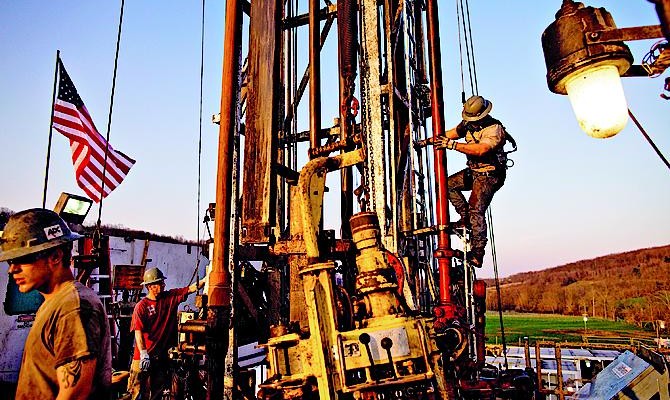Business
investmentsChevron leaves Ukraine due to cheap oil and red tape

The U.S. oil giant Chevron has decided to withdraw from the project of extraction of shale gas in the Olesska field in western Ukraine. Over the last year this is the third and the final major project for extraction of gas with the involvement of large transnational corporations in Ukraine, which has not been developed.
Bidding farewell
Chevron’s unilateral withdrawal from the development of the Olesska field located in the Lviv and Ivano-Frankivsk oblasts was made public yesterday. Chevron has sent a corresponding letter to the Ukrainian government. The reason for its withdrawal is the fact that the Ministry of Finance has not fulfilled its obligations to bring its regulations in compliance with the current legislation of Ukraine by November 18. Deputy Chief of the Presidential Administration Valeriy Chaliy also confirmed Chevron’s intentions yesterday.
Representatives of Chevron also confirmed that the company has sent the letter to the Ukrainian government, but did not name the details and reasons for its move. “It would be premature to comment on it,” said the company’s statement.
Past and thoughts
Earlier there were plans that Chevron would engage in the exploration and production of shale gas in western Ukraine, and invest approximately US $350 mn into exploration in the first stage. The resources of the Olesska field are estimated at nearly 3 trillion cubic meters of gas and the annual production could be 5 – 10 bn cu m.
The document, which gave a full start to this project - the production sharing agreement (PSA) was signed between Ukrainian authorities and Chevron over a year ago in November 2013.
Chevron is the third company, which “slowed down” or simply suspended their cooperation with Ukraine in the gas sector in 2014. Representatives of Shell, an investor in another project (gas production in the Yuzivska field in Kharkiv and the Donetsk oblast), said yesterday that the situation in the east of Ukraine did not allow the company to fulfill some of its obligations as an operator under the PSA, including drilling of the first exploratory well. Therefore, back in August Shell exercised its contractual right to declare force majeure within the framework of the PSA for the Yuzivska field. At this stage, the company still performs only those works that can be carried out safely,” reads the statement from Shell.
The third project – gas production in the Black Sea shelf by the consortium of Exxon Mobil, Shell, Austria's OMV represented by its Romanian subsidiary Petrom and Nadra of Ukraine – was cancelled after the annexation of Crimea.
Bureaucracy will win
Partner at the international consulting firm Grant Thornton Oleksandr Malynovskiy told Capital that the reasons mentioned in the media do not look very convincing, considering, in particular, the presence of the “stabilization clause” in the PSA, which excludes application of adverse changes in the legislation of Ukraine to the investor. “The above reasons for withdrawal of Chevron from the effective PSA do not belong to the category of “essential violations on the part of the state”, as stipulated by the PSA (at least, in accordance with the editions of the PSA, which were published in the media),” he said.
“At this stage, it can be assumed that Chevron’s notification for the government of Ukraine is either the last resort of putting pressure on the Ukrainian side in order to obtain the necessary decisions or legislative changes, or there are some other underlying reasons of such a notification. The fact that Chevron does not officially comment on the reasons for its withdrawal from the project, only confirms such assumptions,” he said.
Another market expert, who asked not to be named, told Capital that given the current prices of oil and situation in the country Ukraine does not fall into the category of countries in which such major corporations would dare to invest, especially given the difficulties of working with the Ukrainian red tape. As an example, the source pointed to other obstacles that Chevron ran up against in Ukraine. “For almost six months the company struggled to simply open a bank account, seeing as the procedure for opening accounts specifically for the PSA is not regulated in Ukraine. If the company is unable to find a quick solution for such a minor problem, what can be said about investing huge sums of money, drilling oil and a number of other factors? My personal impression is that the company has been looking for an excuse to withdraw from the project for quite some time now,” said the source.
War and oil
Industry experts mention other reasons for Chevron’s refusal. Chief of the Analytical Department at Concorde Capital Oleksandr Parashchiy specified: opposition to the project on the part of local authorities in the Lviv and Ivano-Frankivsk oblasts, changes in tax laws and the sharp decline in oil prices. He believes that the main reason is the unstable and unpredictable situation in the country. “There is a war, and, accordingly, the country is not so attractive for investments. It is simply dangerous to spend huge amounts of money in a country that is ravaged by war,” said Parashchiy.
Chief of the Analytical Department at Eavex Capital Dmytro Churin believes that the decline in oil prices could be the final argument for withdrawal from the project. “Oil prices decreased and all the other energy products are pegged to this downward trend. It is possible that this period of low prices will persist for the medium-term of approximately five years. Accordingly, at the moment it is quite risky to invest in more complex development projects, as it is unclear what the prices will be in the foreseeable future. In short, the project is frozen for at least five years,” he concluded.

Ukraine and Russia agreed on their positions in talks on the issue of gas supply
56838
Ukraine may replace 5 bcm of Russian gas by reverse-flow deliveries, fuel oil – Yatseniuk
1 25656
Oettinger: Ukraine to prepay $385 per thousand cubic meters of Russian gas in winter, without "take or pay" obligation
19065



 of the agreement of syndication with Financial Times Limited are strictly prohibited. Use of materials which refers to France-Presse, Reuters, Interfax-Ukraine, Ukrainian News, UNIAN agencies is strictly prohibited. Materials marked
of the agreement of syndication with Financial Times Limited are strictly prohibited. Use of materials which refers to France-Presse, Reuters, Interfax-Ukraine, Ukrainian News, UNIAN agencies is strictly prohibited. Materials marked  are published as advertisements.
are published as advertisements.